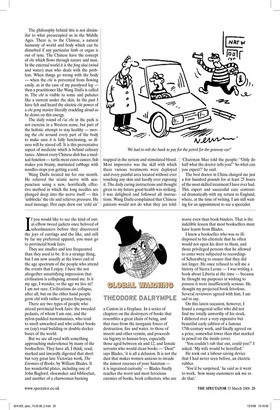A&lobALl w�m THEODORE DALRYMPLE
If you would like to see the kind of outat-elbow tweed jackets once beloved of schoolmasters before they discovered the joys of earrings and the like, and still by far my preferred apparel, you must go to provincial book fairs.
They are smaller and less frequented than they used to be. It is a strange thing, but I am now usually at the lower end of the age spectrum of the people who attend the events that I enjoy. I have the not altogether unsatisfying impression that civilisation is collapsing around me. Is it my age, I wonder, or the age we live in? I am not sure. Civilisations do collapse, after all, but on the other hand people grow old with rather greater frequency.
There are two types of people who attend provincial book fairs: the tweeded pedants, of whom I am one, and the nylon-padded monomaniacs, who tend to smell unwashed and who collect books on (say) road building or double-decker buses of the world.
But we are all eyed with something approaching malevolence by many of the booksellers. They have all, I think, read, marked and inwardly digested that short but very great late Victorian work, The Enemies of Books, by William Blades. It has wonderful plates, including one of John Bagford, shoemaker and biblioclast, and another of a charwoman burning a Caxton in a fireplace. In a series of chapters on the destroyers of books that resembles a great chain of being, and that rises from the inorganic forces of destruction, fire and water, to those of insects and other vermin, and proceeds via bigotry to human boys, especially those aged between six and 12, and female servants who would clean books — ‘Dust!’ says Blades, ‘it is all a delusion. It is not the dust that makes women anxious to invade the inmost recesses of your Sanctum — it is ingrained curiosity’ — Blades finally reaches the worst and most ferocious enemies of books, book collectors, who are worse even than book-binders. That is the indelible lesson that most booksellers must have learnt from Blades.
I knew a bookseller who was so illdisposed to his clientele that he often would not open his door to them, and those privileged persons that he allowed to enter were subjected to recordings of Schoenberg to ensure that they did not linger. He once refused to sell me a history of Sierra Leone — I was writing a book about Liberia at the time — because he thought my purposes in wishing to possess it were insufficiently serious. He thought my projected book frivolous. Several reviewers agreed with him, I am sad to say.
On this latest occasion, however, I found a congenial seller who did not find me totally unworthy of his stock. I dithered over a very expensive but beautiful early edition of a famous 17th-century work, and finally agreed on a price, somewhat lower than that marked in pencil on the inside cover.
‘You couldn’t rub that out, could you?’ I asked. ‘My wife would be horrified.’ He took out a labour-saving device that I had never seen before, an electric rubber.
‘You’d be surprised,’ he said as it went to work, ‘how many customers ask me to do that.’


























































































 Previous page
Previous page